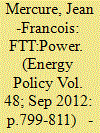| Srl | Item |
| 1 |
ID:
115180


|
|
|
|
|
| Publication |
2012.
|
| Summary/Abstract |
This work introduces a model of Future Technology Transformations for the power sector (FTT:Power), a representation of global power systems based on market competition, induced technological change (ITC) and natural resource use and depletion. It is the first component of a family of sectoral bottom-up models of technology, designed for integration into the global macroeconometric model E3MG. ITC occurs as a result of technological learning produced by cumulative investment and leads to highly nonlinear, irreversible and path dependent technological transitions. The model uses a dynamic coupled set of logistic differential equations. As opposed to traditional bottom-up energy models based on systems optimisation, such differential equations offer an appropriate treatment of the times and structure of change involved in sectoral technology transformations, as well as a much reduced computational load. Resource use and depletion are represented by local cost-supply curves, which give rise to different regional energy landscapes. The model is explored for a single global region using two simple scenarios, a baseline and a mitigation case where the price of carbon is gradually increased. While a constant price of carbon leads to a stagnant system, mitigation produces successive technology transitions leading towards the gradual decarbonisation of the global power sector.
|
|
|
|
|
|
|
|
|
|
|
|
|
|
|
|
| 2 |
ID:
126525


|
|
|
|
|
| Publication |
2013.
|
| Summary/Abstract |
A model is presented in this work for simulating endogenously the evolution of the marginal costs of production of energy carriers from non-renewable resources, their consumption, depletion pathways and timescales. Such marginal costs can be used to simulate the long term average price formation of energy commodities. Drawing on previous work where a global database of energy resource economic potentials was constructed, this work uses cost distributions of non-renewable resources in order to evaluate global flows of energy commodities. A mathematical framework is given to calculate endogenous flows of energy resources given an exogenous commodity price path. This framework can be used in reverse in order to calculate an endogenous marginal cost of production of energy carriers given an exogenous carrier demand. Using rigid price inelastic assumptions independent of the economy, these two approaches generate limiting scenarios that depict extreme use of natural resources. This is useful to characterise the current state and possible uses of remaining non-renewable resources such as fossil fuels and natural uranium. The theory is however designed for use within economic or technology models that allow technology substitutions. In this work, it is implemented in the global power sector model FTT:Power. Policy implications are given.
|
|
|
|
|
|
|
|
|
|
|
|
|
|
|
|